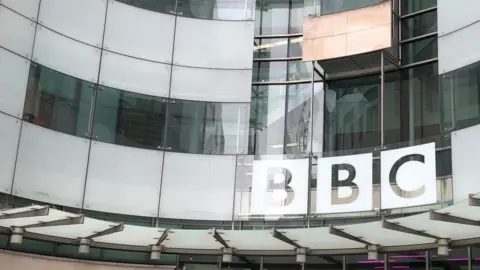Police 'assessing information' on presenter allegations after BBC meeting
 BBC
BBCPolice are "assessing" information from the BBC about allegations against a presenter, but said there was "no investigation at this time".
A Metropolitan Police spokesperson said detectives held a virtual meeting with BBC representatives on Monday.
The Met is now making further enquiries "to establish whether there is evidence of a criminal offence being committed".
The Sun has reported that an unnamed presenter has been accused of paying a teenager for sexually explicit photos.
The newspaper claimed that the man had paid the individual tens of thousands of pounds for the images, starting when the young person was 17.
On Sunday, the BBC said a staff member had been suspended, but has not identified him.
A police statement said: "Detectives from the Met's Specialist Crime Command met with representatives from the BBC on the morning of July 10. The meeting took place virtually.
"They are assessing the information discussed at the meeting and further enquiries are taking place to establish whether there is evidence of a criminal offence being committed. There is no investigation at this time."
'Working to establish facts'
The corporation said it first became aware of a complaint in May, and that "new allegations" were received on Thursday, the day before The Sun first published its claims.
On Sunday evening, The Sun reported that the young person's family was said to be upset by the corporation's latest response, alleging "no-one from the BBC rang them for a proper interview after the initial complaint".
The paper also claimed the BBC presenter made what it called two "panicked calls" to the young person - who is now 20 - after the original story came out.
Concerns have been raised about the BBC's complaints process - primarily, what steps were taken to question the presenter and to investigate further.
In a statement on Sunday, the BBC said it was working as fast as possible "to establish the facts in order to properly inform appropriate next steps".
"The BBC first became aware of a complaint in May," it said. "New allegations were put to us on Thursday of a different nature and in addition to our own enquiries we have also been in touch with external authorities, in line with our protocols."
It added that the corporation expected to be in a position to provide a further update on the process in the coming days.
Falsely named
A number of BBC presenters, including Rylan Clark, Gary Lineker, Nicky Campbell, Jeremy Vine and Jon Kay, have distanced themselves from the allegations on social media in recent days.
On BBC Radio 5 Live, Campbell opened his programme on Monday by saying: "Thoughts with the alleged victim and family."
He added: "It was a distressing weekend, I can't deny it, for me and others falsely named.
"Today I'm having further conversations with the police in terms of malicious communication and with lawyers in terms of defamation."
Following the false accusations online about Campbell, the Met said on Monday that it had received a report of malicious communication on Saturday "in relation to a post on social media".
"An investigation is under way and enquiries are ongoing. There have been no arrests," the force added.
Vine described his experiences on his Radio 2 show on Monday. "I'm in that shortlist of BBC presenters who ended up being smacked around on Twitter yesterday and the day before," he said. "But what can you do? Are you going to tell me to take out 85 different lawsuits?"
Speaking earlier on Channel 5, Vine stressed he was "completely innocent of any of this", describing social media as "just basically a massive fountain of sewage, and someone needs to put a cap on it".

How does BBC News cover stories about the BBC?
With stories like this one, BBC News journalists treat the BBC in the same way as any other organisation the news service reports on.
And like with any other organisation, BBC News has to ask BBC management or BBC services for responses and contact the BBC press office for official statements.
Occasionally BBC journalists approach senior managers for unplanned interviews - known as "doorsteps" in the news business.
They sometimes also get offered interviews with management - like this one with Mr Davie over the Gary Lineker row.
And when this happens, they know they'll be scrutinised within and outside the BBC over how well they hold their boss to account.
